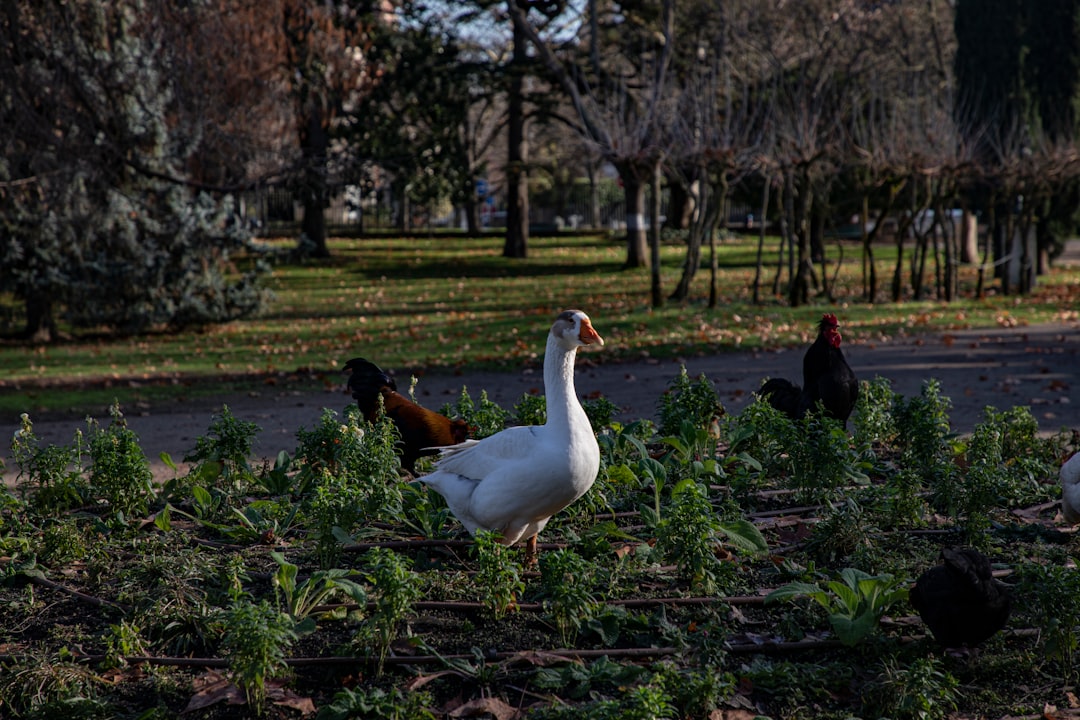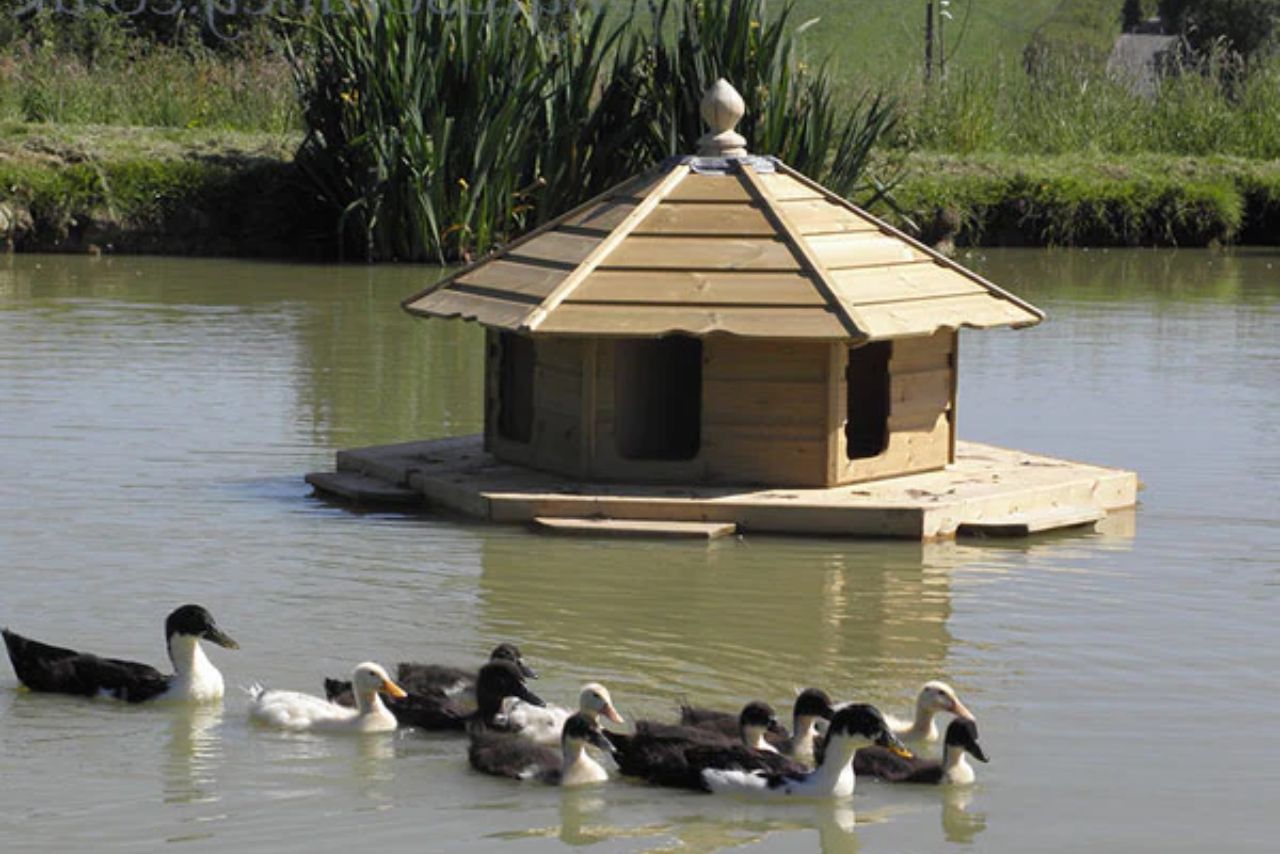Ducks can be a wonderful addition to any pond, providing both entertainment and beauty. However, keeping them safe can be a challenge, as they are vulnerable to predators and other dangers.
In this blog post, we will explore the various ways you can ensure the safety of your ducks on a pond.
From designing your pond to prevent predators, to feeding your ducks the right food, we will cover all the important aspects of keeping ducks safe on a pond.
So, if you are a pond owner looking to add ducks to your pond, or if you already have ducks and want to make sure they are safe, then keep reading!
How To Keep Ducks Safe On A Pond? Keeping ducks safe on a pond requires proper pond design, predator prevention, and feeding.
To prevent predators, the pond should have steep banks, dense vegetation, and a predator-proof fence. Ducks should also have a shelter to hide in during the night.
Feeding ducks should be done with a balanced diet of pellets, grains, and fresh greens. Ducks also require clean water and regular maintenance of the pond.
With these measures in place, pond owners can ensure the safety and well-being of their ducks.
Can Ducks Survive In A Pond?
Yes, ducks can survive in a pond as long as the pond is well-designed and maintained.
However, it is important to note that ducks can be vulnerable to diseases if the water is not clean or if there are too many ducks in one pond.
To prevent this, it is recommended to limit the number of ducks based on the size of the pond and to regularly clean and maintain the water quality.
Additionally, providing a shallow area for drinking and preening will help keep ducks healthy and happy.
Overall, keeping ducks safe on a pond requires proper planning, maintenance, and care.
How Long Can Ducks Stay In Water?

Ducks can stay in water for long periods of time from 10 to 30 seconds, as they are adapted to living in aquatic environments.
However, it is important to provide them with a dry area to rest and preen themselves.
This can be done by creating a small island or providing a ramp for them to climb onto. Ducks also need access to land for nesting and breeding during the mating season.
How To Keep Ducks Safe On A Pond?
Here are simple steps to keep our ducks safe in pond:
1. Ensure The Pond Is Deep Enough For Ducks To Swim And Dive
When considering keeping ducks, it is essential to ensure that the pond is deep enough for them to swim and dive. Ducks are waterfowl and require water to live a healthy and happy life.
The ideal depth for a duck pond should be at least 2 feet. This depth ensures that the ducks can swim and dive comfortably without touching the bottom and getting injured.
The pond’s size is also important, as it should be large enough to give the ducks enough space to swim and move around.
A pond that is too small can become overcrowded, leading to health problems for the ducks and a messy and unpleasant environment.
2. Include Shallow Areas For Resting And Feeding
When designing a pond or water feature for your garden, it’s important to consider the needs of the aquatic life that will inhabit it. One crucial element to include is shallow areas for resting and feeding.
This is particularly important for amphibians, such as frogs and toads, who need areas with shallow water to lay their eggs and for tadpoles to thrive.
Shallow areas also provide a safe haven for fish to spawn and for young fish to grow.
Additionally, shallow water is a prime location for aquatic plants to grow, which can serve as a food source for herbivorous fish and insects.
When planning your water feature, be sure to include at least one shallow area with a gradual slope.
This will not only benefit the aquatic life, but also provide a beautiful and natural-looking element to your garden.
3. Add Vegetation For Cover And Food Sources

Another way to keep ducks safe on a pond is by adding vegetation for cover and food sources.
Ducks love to nibble on aquatic plants, so including them in your pond will provide a natural food source for your feathered friends.
Additionally, the plants can serve as cover from predators and provide a place for ducks to rest and hide during the day.
When selecting aquatic plants for your pond, it’s important to choose native species that are suitable for your climate and water conditions.
Non-native plants can become invasive and harm the ecosystem of your pond. By adding vegetation to your pond, you can create a natural habitat that will help keep your ducks safe and healthy.
4. Install Fencing Or Netting Around The Pond
Another important measure to keep ducks safe on a pond is to install fencing or netting around the pond. This will help prevent predators such as foxes, raccoons, and birds of prey from accessing your ducks.
Fencing should be buried at least six inches into the ground to prevent predators from digging underneath it.
Netting should be securely fastened to posts or trees surrounding the pond and be high enough to prevent birds of prey from swooping down and snatching your ducks.
Remember to check the fencing or netting regularly for any damage or holes that may allow predators in.
5. Use Motion-activated Lights And Sound Devices
Another way to keep ducks safe on a pond is by using motion-activated lights and sound devices.
These devices can help scare away predators that may be lurking around the pond, especially at night.
Motion-activated lights will turn on when they detect movement, which can startle predators and make them flee. Sound devices such as sirens or loud noises can also be effective in scaring off predators.
It’s important to note that these devices should not be used excessively or near residential areas to avoid disturbing your neighbors.
6. Remove Attractants Such As Fallen Fruit Or Garbage
It’s important to remove any attractants that may lure predators to your pond. Fallen fruit, garbage, and compost piles can all attract animals that may harm your ducks.
Make sure to keep the area surrounding the pond clean and free of any food waste or debris.
Regularly removing any fallen leaves or branches from trees near the pond can also help prevent predators from using them as a hiding spot.
7. Provide A Balanced Diet Of Commercial Feed And Natural Food Sources
In addition to natural food sources, it’s important to provide your ducks with a balanced diet of commercial feed.
This will ensure that they receive all the necessary nutrients to maintain good health and overall well-being.
Ducks require a diet high in protein, which can be found in commercial duck feed or supplements like mealworms or crickets.
However, it’s important not to overfeed your ducks as this can lead to obesity and health problems.
8. Ensure Food Is Not Left Out Overnight To Attract Predators
Lastly, it’s important to ensure that any food is not left out overnight as this can attract predators. Ducks tend to feed during the day, so any uneaten food should be removed before nightfall.
This will prevent attracting raccoons, opossums, and other nocturnal animals that may harm your ducks.
Keeping a clean and well-maintained pond will not only provide a safe environment for your ducks but also enhance the aesthetics of your garden.
Is There Any Harm To Ducks In Ponds?
If you have a pond on your property, you may be wondering if it’s safe for ducks to swim in. The short answer is yes, it is safe for ducks to be in ponds. In fact, ponds can provide a great habitat for ducks and other waterfowl.
However, it’s important to keep in mind that there are potential risks to ducks if the pond is not properly maintained.
One of the biggest risks is pollution. Chemicals like pesticides, herbicides, and fertilizers can be harmful to ducks and other wildlife.
Another risk is predators. Ducks are vulnerable to predators like raccoons, foxes, and even domestic cats and dogs.
To keep your ducks safe, make sure your pond is clean and free of pollutants, and consider adding some type of fencing or cover to protect against predators.
Do Ducks Sleep In Water?
Ducks can sleep both on land and in water. However, they need a safe and secure place to rest at night, especially if there are predators around.
Ducks usually prefer to sleep in groups, huddled together for warmth and protection.
If you have a pond on your property, consider providing your ducks with a floating shelter or platform where they can sleep safely at night.
This will not only protect them from predators but also provide them with a comfortable place to rest.
How Can I Protect My Ducks From Predators When My Pond Is By The Woods?
If your pond is located near the woods, it’s important to take extra precautions to protect your ducks from predators.
One effective method is to install a fence or barrier around the perimeter of the pond. This will prevent predators from easily accessing the area and keep your ducks safe.
You can also consider adding some type of cover or shelter for your ducks to hide in during times of danger.
Another option is to use motion-activated lights or sound devices to scare off predators when they approach the pond.
Bottom Line: How To Keep Ducks Safe On A Pond?
Keeping ducks safe on a pond requires proper maintenance and precautions. It’s important to provide a clean and well-maintained environment, balanced diet, and protection against predators.
Avoid leaving food out overnight to prevent attracting nocturnal predators, and make sure your pond is free of pollutants. Providing a safe place for your ducks to rest at night is also crucial.
If your pond is located near the woods or other potential predator habitats, installing a fence or barrier can help keep your ducks safe.
Motion-activated lights or sound devices can also be effective in scaring off predators.
FAQs
Is it safe for ducks to be in a pond?
Yes, ponds can provide a great habitat for ducks and other waterfowl.
How can I protect my ducks from predators when my pond is near the woods?
Installing a fence or barrier, providing cover or shelter, and using motion-activated lights or sound devices can help keep predators away.
What should I do if I find pollutants in my pond?
Remove any pollutants and ensure that they are properly disposed of to prevent harm to your ducks and other wildlife.
How often should I clean my pond to keep my ducks safe?
Regular maintenance is important, and you should clean your pond as often as needed to keep it free of pollutants and debris.




